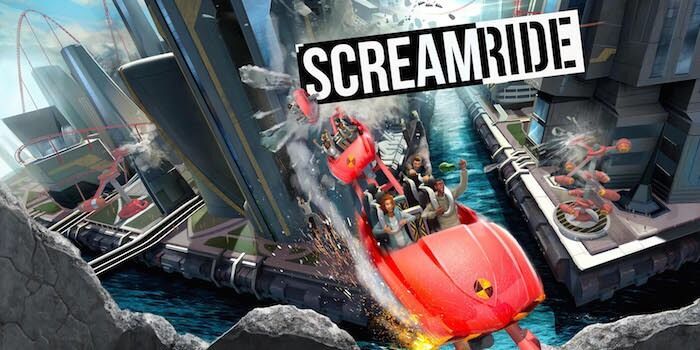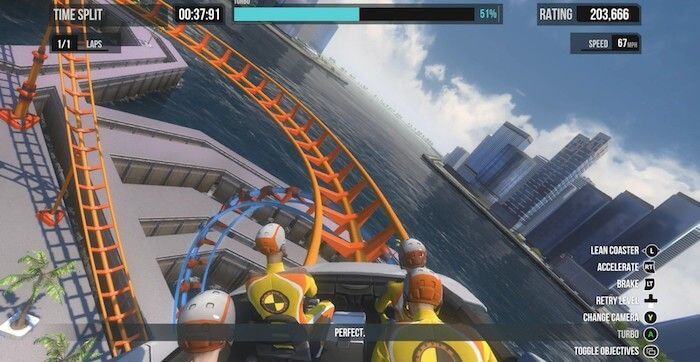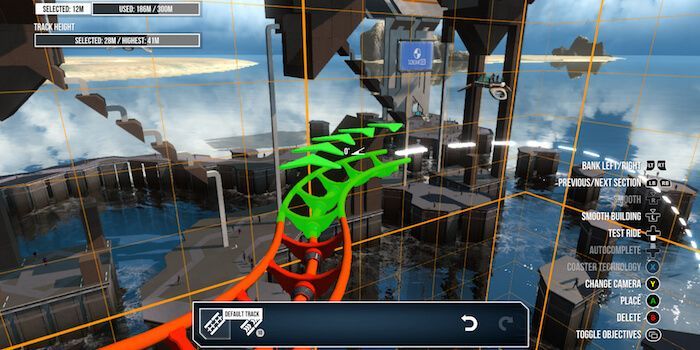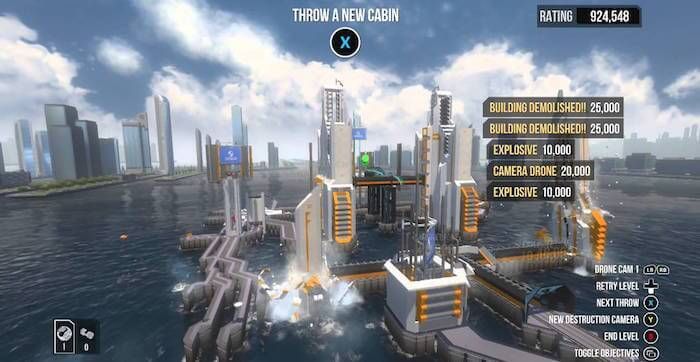
ScreamRide Review
By Anthony Taormina 26 August 2015
Imagine if Trials Evolution, Roller Coaster Tycoon, and Angry Birds had a baby – that’s ScreamRide. The latest release from Frontier Developments (Zoo Tycoon, Coaster Crazy, Kinectimals) borrows heavily from the arcade-style games that came before, but tries to chart a new patch, or in this case a roller coaster track, with a tongue-in-cheek sensibility and a proclivity for over-the-top intensity.
While ScreamRide may bear some similarities to games like Trials and Roller Coaster Tycoon, it’s hard to confine the title to just one genre. Its creation tools give players the freedom to make any thrilling roller coaster they like, from the tame to the extreme, and it’s pick-up-and-play pre-made levels feed that high score-hungry drive, but that’s only a small part of the larger picture.
At its core, ScreamRide offers three different modes structured around extreme theme park coasters or thrill rides. The Scream Rider mode is the game’s signature option and asks players to try to manage speed, excitement, and a score multiplier while also giving the AI riders a scream they won’t soon forget. Players can rack up speed boosts by timing button presses during certain lengths of track and at times increase their score by keeping the coaster on two wheels across turns. It’s the roller coaster ride from hell, and only the player who can toe the delicate line between excitement and danger will succeed.
At first, Scream Rider is fairly inconspicuous – players hold down the accelerate button and guide the coaster from beginning to end with no derails. But eventually the game introduces new obstacles like single track portions that require riding on two wheels or sharp turns that force brake management. By the time players reach the sixth and final area, Scream Rider becomes its own, Trials Evolution-esque challenge, wherein the player’s ability to control the speed of the coaster and their reflexes will be tested. So, while at first Scream Rider might seem fairly uninvolved, it becomes a true challenge to get through an entire track without derailing. And even after that, there’s always the draw to go back for a higher score.

The only real drawback to Scream Rider is that a lot of the obstacles are obscured by the camera and therefore it becomes less about reaction time and more about memorization. There were plenty of times when a portion that required the coaster lean up on two wheels came out of nowhere and ended any shot at a perfect run. Sure, you can always restart the track, which is extremely fast on Xbox One, but that diminishes some of the fun of ScreamRide.
While Scream Rider is focused exclusively on keeping the car on the track, the Demolition mode is the complete opposite. In this mode, players will be sending riders flying into buildings in the hopes of triggering catastrophic collapses. Think of it like a somewhat sadistic version of Angry Birds, where players are flinging tiny spherical “coasters” at the weak points of futuristic buildings. At first, the goal is mostly just to get the right trajectory and speed, which can be adjusted both before and after launch, but eventually the mode unlocks different types of coasters, some that break apart mid-air for more destructive capabilities and others that have a post-launch boost for added distance.
It may not be very original, but Demolition is engaging enough and offers enough replay value that it’s a nice accompaniment to Scream Rider. Watching these massive buildings topple or collapse is always satisfying, and there’s always the feeling that you can do slightly better the next time and hopefully reach a higher score.
The final pre-packaged mode for ScreamRide is Engineer, which comes in two different flavors. One gives players a set of track and asks them to connect the pieces while also fulfilling some specific requirements (include a loop, keep nausea low, etc.). The other presents players a short length of track and asks that they add enough additional track to launch the coaster into buildings, almost like a free form Demolition.

While the first option does give players their first taste of the game’s creation tools it puts too many restrictions on creativity. With a blank canvas, players will want to let their imagination run wild, but each level only allots a certain length of track. The UI is intuitive enough that it’s easy to go back and delete track, but the mode itself feels a little restrictive. It’s a fine idea to try and get players to satisfy a checklist in a given area, but the limitations lessen the fun.
The destruction-focused Engineer option, however, is gleefully silly and the perfect distraction. Where past roller coaster games discouraged crashes or missing track, these levels relish the destruction, while playfully dismissing the death. It may be a little twisted, but levels like these are a perfect opportunity to unwind.
Across those three modes, which offer 6 areas and roughly three levels per, ScreamRide delivers enough variety and clever, easily repeatable gameplay to be engaging on many levels. But, its longevity will come from its creation and level sharing tools, which allow gamers to make their own Scream Rider, Demolition, or Engineer levels for any to download. Here is where that Roller Coaster Tycoon connection really shines, giving players the chance to let their wildest coaster-building fantasies free.
The only real downside to the creation tools is their lack of precision and fine-tuning. Because the game uses a controller, it can be difficult get the trajectory or angle of a piece of track just right. Placing and deleting track is easy and the tools come with a lot of pre-fabricated loops, twists, and other special pieces, but getting your coaster just the way you want it can sometimes be frustrating. It’s certainly possible to get the track close enough, but when any jarring shifts can send riders flying it would have been nice to be precise but quick in track placement.

Overall, though, ScreamRide is an easy recommendation for fans of the arcade-y, high score obsessed crowd. Its use of roller coasters to create a Trials-esque series of levels is refreshing and addictive, while the Demolition and Engineer modes offer playful but engaging offshoots from that concept. Each mode has a few flaws, but they are easy to get past with a little patience. However, ScreamRide’s long-term legacy will likely be determined by its community and whether they can continue to create new levels for players to enjoy.
That being said, at $39.99 for the Xbox One version ScreamRide may be a tough proposition for some. It’s far more substantial than a downloadable offering and is by no means a one-trick pony, but some may feel the price tag is a little too steep. For our part, ScreamRide is an enjoyable, pick-up-and-play title with a great sense of humor, soaked in creativity. There really is no game like it and that alone should make it worth checking out.
What do you think of ScreamRide? Does the game’s unique concepts interest you?
ScreamRide releases March 2, 2015 for Xbox 360 and Xbox One. Game Rant was provided an Xbox One code for this review.
